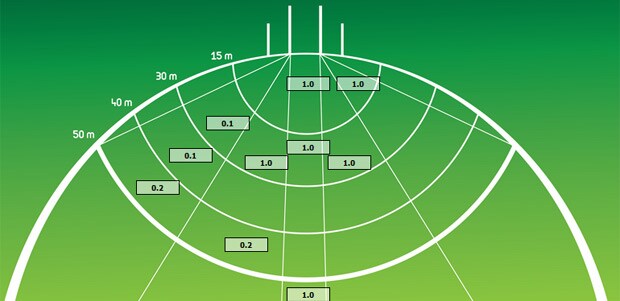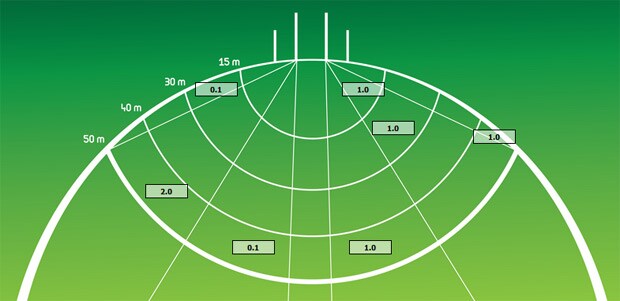While the half-time deficit of 27 points seemed daunting, the inside 50 entries indicated that all hope was not lost. North’s tally of 25 entries was only two fewer than Essendon’s - but it was the efficiency that was crippling the Roos’ chances.
| Elimination Final, first half | Total inside 50's | Total scoring shots |
| North Melbourne | 25 | 6 |
| Essendon | 27 | 13 |
It was a surprising development, given each side’s respective scoring prowess during the season.
Over the course of the home and away season, North ranked third in scores per inside 50, while Essendon was a lowly 16th. So despite the script being flipped during the first half of the Elimination Final, the numbers suggested there was every chance of a turnaround.
Despite the Bombers stretching the lead to 33 points in the early stages of the third quarter, the issues with the ball movement suddenly disappeared.
With 12 Kangaroos’ goals in the second half, the perception might have been that it was due to many more inside 50’s.
It wasn’t the case though – there were only nine more entries in the second half.
| Elimination Final | Total inside 50's | Total scoring shots |
| North Melbourne, first half | 25 | 6 |
| North Melbourne, second half | 34 | 17 |
| Essendon, first half | 27 | 13 |
| Essendon, second half | 26 | 8 |
With weight of numbers not providing the solution, we have to look elsewhere to see what caused the shift in scoring power. Once we look at where and how the inside 50’s came about, the answer is clear.
During the first half, a combination of Essendon’s superior pressure and North’s want to keep possession meant the ball was moved relatively slowly. North played on from only a quarter of its marks.
After the long break, the number increased to more than half, a drastic jump.
The slower ball movement in the first half meant that Essendon was able to protect the corridor. Only eight entries came through the middle of the ground, with the last two quarters almost doubling that number to 15.
| North Melbourne | Mark-play on % | % of inside 50's via corridor |
| First half | 27.9% | 32% |
| Second half | 50.8% | 44.1% |
The extra pressure North posed when in possession also allowed it to defend much better, and force Essendon to tougher shots on goal.
Although the scoreboard shows that Essendon kicked six goals in each the first and the second half, a look at the scoring chart makes it clear that on most other nights, it would have been far less after half time.
The majority of the Bombers’ scoring shots came from extremely tight angles - whether it was Tom Bellchambers’ effort after the three quarter time siren, Joe Daniher in the final term or Patrick Ryder snapping from 50, the degree of difficulty was usually quite high.
Essendon’s scoring shots in the first half

Essendon’s scoring shots in the second half

More of the same second half performance will be needed again on Friday night when North takes on Geelong at the MCG.


